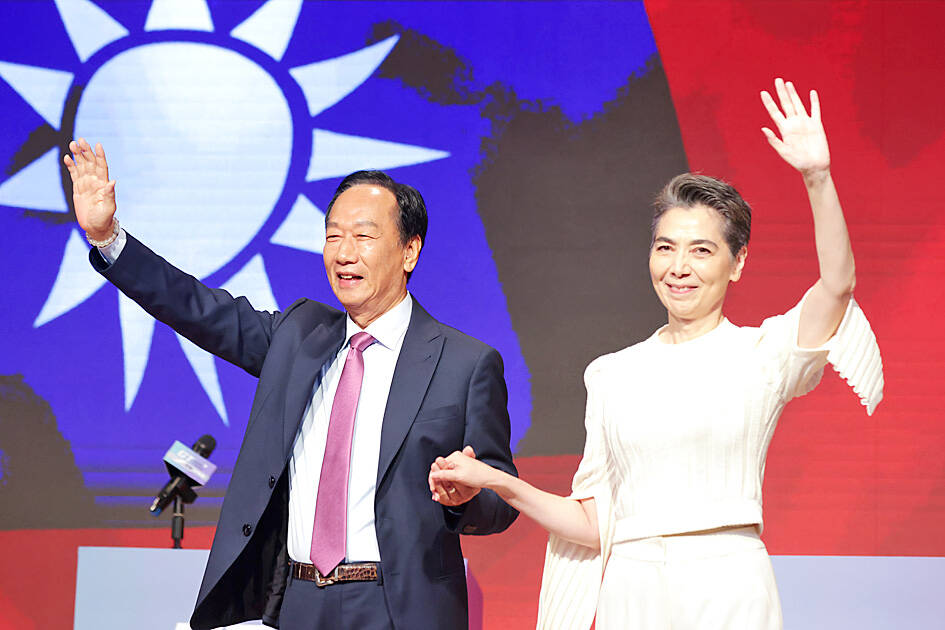Independent presidential candidate Terry Gou (郭台銘) yesterday named actress Tammy Lai (賴佩霞), known for her role in the Netflix political drama Wave Makers (人選之人), as his running mate for the election in January next year.
Gou, the founder of Hon Hai Precision Industry Co (鴻海精密), said at an event in Taipei that he would depend on Lai’s “unique female perspective to foster a more equitable and gender-balanced culture in Taiwan.”
Lai, who portrayed the president in Wave Makers, said that as vice president she would urge overseas businesspeople to “return, invest and remain in Taiwan.”

Photo: RITCHIE B. TONGO, EPA-EFE
Young people cannot envision getting married and having children without a stable economy, depriving many of the joys of grandchildren, Lai said.
“I’m sure we all still remember the incidents in Cambodia, which represented a parent’s worst nightmare,” she said, an apparent reference to cases of Taiwanese being trafficked and imprisoned by telecoms fraud rings in the Southeast Asian nation.
“Due to the poor economic conditions, we were unable to keep our children with us. There is no way we will allow that to happen again,” she said.
Lai said that as vice president, she would communicate the credentials and policies of Gou’s independent ticket by “engaging with opposition parties, the media and most importantly, the public.”
Lai has a master’s degree in international relations and a doctorate in law from China’s Jinan University, Gou’s campaign office said in a statement following the press event.
She is also a writer and the founder of the Collaborative Communications Academy, which advocates for positive communication skills, the statement said.
She would need to renounce her US citizenship to be eligible to run in next year’s election, which it said she would do soon.
Due to a lack of party affiliation, Gou must collect signatures from 289,667 people by Nov. 2 to make it onto the ballot, Central Election Commission (CEC) rules say.
The entrepreneur-turned-politician is also required to register his independent candidacy with the CEC no later than Sunday, the rules say.
His campaign cannot begin the signature drive until after his candidacy is registered.
However, there is speculation that Gou’s campaign would seek a candidacy pact with Taiwan People’s Party Chairman Ko Wen-je (柯文哲) and New Taipei City Mayor Hou You-yi (侯友宜) of the Chinese Nationalist Party (KMT).
Lai appeared to signal her support for a pact, saying it would be her “mission” to fulfill Gou’s goal of “integrating the opposition.”
Ko described Lai as a “strong candidate” who has been engaged in charitable activities for the past few years.
Hou said that he has been recruited as the KMT’s candidate and intends to “unite all forces to move forward.”
Asked whether he thought the announcement of Lai as Gou’s running mate was timed to coincide with the start of his eight-day trip to the US, Hou said he had not been aware of Gou’s plans.
Separately, the nominees for the Golden Bell Awards were announced, with Lai receiving a Best Supporting Actress nomination in the miniseries/TV movie category for her role in Wave Makers.

CHAOS: Iranians took to the streets playing celebratory music after reports of Khamenei’s death on Saturday, while mourners also gathered in Tehran yesterday Iranian Supreme Leader Ayatollah Ali Khamenei was killed in a major attack on Iran launched by Israel and the US, throwing the future of the Islamic republic into doubt and raising the risk of regional instability. Iranian state television and the state-run IRNA news agency announced the 86-year-old’s death early yesterday. US President Donald Trump said it gave Iranians their “greatest chance” to “take back” their country. The announcements came after a joint US and Israeli aerial bombardment that targeted Iranian military and governmental sites. Trump said the “heavy and pinpoint bombing” would continue through the week or as long

TRUST: The KMT said it respected the US’ timing and considerations, and hoped it would continue to honor its commitments to helping Taiwan bolster its defenses and deterrence US President Donald Trump is delaying a multibillion-dollar arms sale to Taiwan to ensure his visit to Beijing is successful, a New York Times report said. The weapons sales package has stalled in the US Department of State, the report said, citing US officials it did not identify. The White House has told agencies not to push forward ahead of Trump’s meeting with Chinese President Xi Jinping (習近平), it said. The two last month held a phone call to discuss trade and geopolitical flashpoints ahead of the summit. Xi raised the Taiwan issue and urged the US to handle arms sales to

A magnitude 5.6 earthquake struck off the coast of Yilan County at 12:37pm today, with clear shaking felt across much of northern Taiwan. There were no immediate reports of damage. The epicenter of the quake was 16.9km east-southeast of Yilan County Hall offshore at a depth of 66.8km, Central Weather Administration (CWA) data showed. The maximum intensity registered at a 4 in Yilan County’s Nanao Township (南澳) on Taiwan’s seven-tier scale. Other parts of Yilan, as well as certain areas of Hualien County, Taipei, New Taipei City, Taoyuan, Hsinchu County, Taichung and Miaoli County, recorded intensities of 3. Residents of Yilan County and Taipei received

Taiwan has secured another breakthrough in fruit exports, with jujubes, dragon fruit and lychees approved for shipment to the EU, the Ministry of Agriculture said yesterday. The Animal and Plant Health Inspection Agency on Thursday received formal notification of the approval from the EU, the ministry said, adding that the decision was expected to expand Taiwanese fruit producers’ access to high-end European markets. Taiwan exported 126 tonnes of lychees last year, valued at US$1.48 million, with Japan accounting for 102 tonnes. Other export destinations included New Zealand, Hong Kong, the US and Australia, ministry data showed. Jujube exports totaled 103 tonnes, valued at